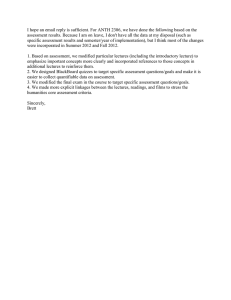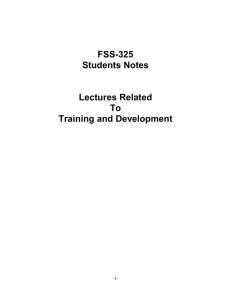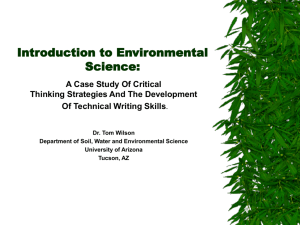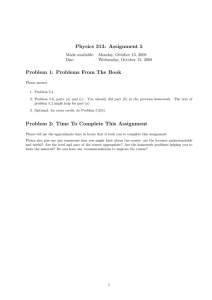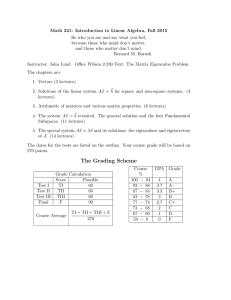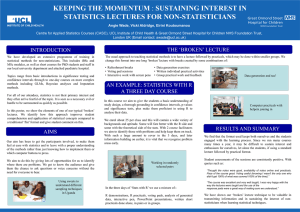Module Descriptor
advertisement
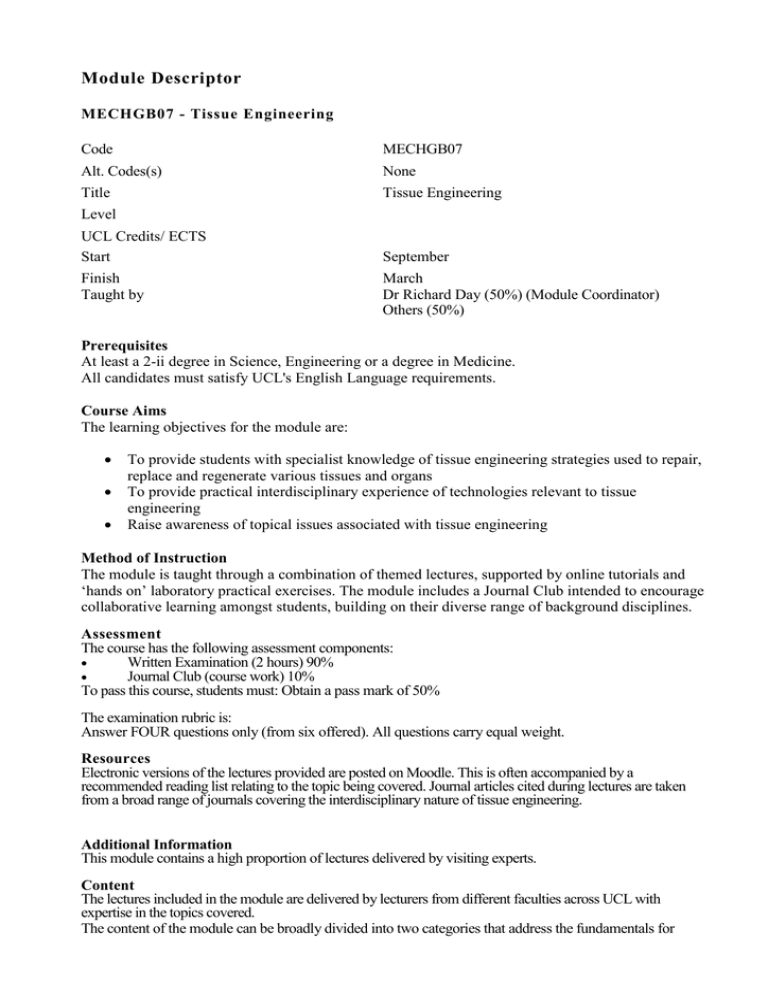
Module Descriptor MECHGB07 - Tissue Engineering Code MECHGB07 Alt. Codes(s) None Title Tissue Engineering Level UCL Credits/ ECTS Start Finish Taught by September March Dr Richard Day (50%) (Module Coordinator) Others (50%) Prerequisites At least a 2-ii degree in Science, Engineering or a degree in Medicine. All candidates must satisfy UCL's English Language requirements. Course Aims The learning objectives for the module are: To provide students with specialist knowledge of tissue engineering strategies used to repair, replace and regenerate various tissues and organs To provide practical interdisciplinary experience of technologies relevant to tissue engineering Raise awareness of topical issues associated with tissue engineering Method of Instruction The module is taught through a combination of themed lectures, supported by online tutorials and ‘hands on’ laboratory practical exercises. The module includes a Journal Club intended to encourage collaborative learning amongst students, building on their diverse range of background disciplines. Assessment The course has the following assessment components: Written Examination (2 hours) 90% Journal Club (course work) 10% To pass this course, students must: Obtain a pass mark of 50% The examination rubric is: Answer FOUR questions only (from six offered). All questions carry equal weight. Resources Electronic versions of the lectures provided are posted on Moodle. This is often accompanied by a recommended reading list relating to the topic being covered. Journal articles cited during lectures are taken from a broad range of journals covering the interdisciplinary nature of tissue engineering. Additional Information This module contains a high proportion of lectures delivered by visiting experts. Content The lectures included in the module are delivered by lecturers from different faculties across UCL with expertise in the topics covered. The content of the module can be broadly divided into two categories that address the fundamentals for tissue engineering (vascularization of tissue constructs, the role of the immune response, bioprocessing techniques, and scaffolding technology) and applications of tissue engineering to different organs throughout the body (the cornea, retina, lung, airway, gut, nervous system, musculoskeletal system). Learning Outcomes for MECHGB07 Tissue Engineering General Learning Outcomes Ability to develop, monitor & update a plan, to reflect a changing operating environment N/A Ability to monitor and adjust a personal program of work on an on-going basis, and to learn independently A significant amount of self-learning is expected, the student is guided in this activity. The ability to exercise initiative and personal responsibility, which may be as a team member or leader N/A The ability to learn new theories, concepts and methods etc and apply these in unfamiliar situations The lectures are given by individuals whose research specialities are in this subject area, so ability to learn new theories, concepts and methods and how to apply them is provided. Specific Learning Outcomes Underpinning science & Mathematics A comprehensive understanding of the relevant scientific principles of the specialisation The students have degree level physical and/or life sciences knowledge, and at the start of the module some bridging lectures are provided. A critical awareness of current problems and/or new insights much of which are at, or informed by, the forefront of the specialisation. Each component in the module is illustrated by case studies and in some instances by relevant practical demonstrations. An understanding of concepts relevant to the discipline, some from outside engineering, and the ability to critically evaluate and apply them effectively. Much of the module relates to concepts relevant to biology, medicine and clinical practice. Engineering Analysis Ability to use fundamental knowledge to investigate new and emerging technologies Tissue Engineering is an evolving subject, the students receive details of this scenario via lectures and laboratory practicals in disciplines relevant to this technology. New concepts/approaches are studied and evaluated in each sub-section of the module. Ability to apply appropriate models for solving problems in engineering and the ability to assess the limitations of particular cases; The module includes ‘hands on’ laboratory practicals intended to provide the students with experience of handling cells and aseptic technique, as well as experience of techniques commonly used to evaluate the biocompatibility of materials. The online ‘Virtual Laboratory’ includes further information and examples of laboratory techniques and data analysis simulation exercises. The ability to collect and analyse research data and use appropriate engineering tools to tackle unfamiliar problems, such as those with uncertain or incomplete data or specifications, by the appropriate innovation, use or adaptation of engineering analytical methods. N/A Design N/A The ability to apply original thought to the development of practical solutions for products, systems, components or processes N/A Economic, Social and Environmental Context Knowledge and understanding of management and business practices, and their limitations, and how these may be applied appropriately, in the context of the particular specialisation N/A The ability to make general evaluations of risks through some understanding of the basis of such risks The ethical aspects of tissue engineering in medical practice are covered wherever necessary. Engineering Practice A thorough understanding of current practice and its limitations, and some appreciation of likely new developments This is delivered in the lecture components. Advanced level knowledge and understanding of a wide range of engineering materials and components This is delivered in the lecture components. The ability to apply engineering techniques taking account of a range of commercial and industrial constraints This is delivered in the lecture components.
